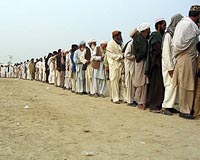| . |  |
. |
Champaign, Ill. (UPI) Feb 9, 2011 Taking a break from a task requiring sustained attention can dramatically improve the ability to focus on the task for prolonged periods, U.S. researchers say. The study by University of Illinois researchers overturns a long-held theory about the nature of attention and the phenomenon of decreasing focus and performance during long tasks, a university release said Tuesday. Some researchers have believed this so-called vigilance decrement is the result of a drop in one's "attentional resources." However, UI psychology Professor Alejandro Lleras says the new study contradicts that. "For 40 or 50 years, most papers published on the vigilance decrement treated attention as a limited resource that would get used up over time, and I believe that to be wrong," Lleras says. "You start performing poorly on a task because you've stopped paying attention to it. But you are always paying attention to something. Attention is not the problem." In the study, Lleras tested participants' ability to focus on a repetitive computerized task for about an hour under various conditions. One group, allowed to take two brief breaks from the task, was able to stay focused during the entire experiment, while other groups not allowed breaks tended to lose focus. The study reinforces the idea the brain is built to detect and respond to change, Lleras says, and suggests that prolonged attention to a single task actually hinders performance. "From a practical standpoint, our research suggests that, when faced with long tasks (such as studying before a final exam or doing your taxes), it is best to impose brief breaks on yourself," Lleras says. "Brief mental breaks will actually help you stay focused on your task."
Share This Article With Planet Earth
Related Links All About Human Beings and How We Got To Be Here
 Study warns of climate-driven migration
Study warns of climate-driven migrationNew Delhi (UPI) Feb 8, 2011 Climate-triggered migration will accelerate in the coming decades in the Asia-Pacific region, says a forthcoming Asian Development Bank report. Typhoons, cyclones, floods and drought have already caused temporary or long-term dislocation of millions of people in countries such as Malaysia, Pakistan, China and the Philippines, ADB said. "This process is set to accelerate in coming ... read more |
|
| The content herein, unless otherwise known to be public domain, are Copyright 1995-2010 - SpaceDaily. AFP and UPI Wire Stories are copyright Agence France-Presse and United Press International. ESA Portal Reports are copyright European Space Agency. All NASA sourced material is public domain. Additional copyrights may apply in whole or part to other bona fide parties. Advertising does not imply endorsement,agreement or approval of any opinions, statements or information provided by SpaceDaily on any Web page published or hosted by SpaceDaily. Privacy Statement |